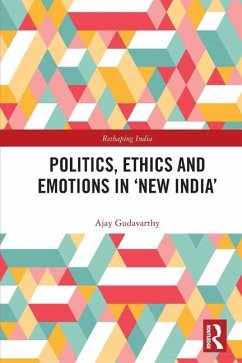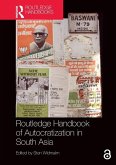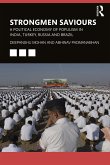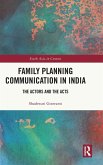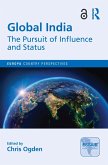How do emotions mobilise in politics? How do they frame ideologies? Broadly focusing on these questions, this book explains the role emotions play in Indian politics and the part they played in the aftermath of the 2019 general elections. It traces the consolidation of the Right in India and highlights the reasons for its electoral successes with a focus on the interplay between ethics and emotions such as fear, anxiety, guilt, shame, anger, hatred, betrayal, and violence. At the same time, it traces the changing dynamic in the way we think about politics and analyses the failure of liberal democratic institutions to make space for emotions in politics and political motivations.
An accessible and essential guide to understanding contemporary India, this book will be of great interest to scholars and researchers of politics, especially governance and political theory, as well as South Asian studies.
An accessible and essential guide to understanding contemporary India, this book will be of great interest to scholars and researchers of politics, especially governance and political theory, as well as South Asian studies.
'Analysing cultural hegemony independently from material domination, Gudavarthy's intellectual achievement in this book is remarkable. Drawing on new theorising about meaning and emotion, he develops a subtle new take on India's rightward turn, even as he provides critical commentary on contemporary events.'
Jeffrey Alexander, Lillian Chavenson Saden Professor of Sociology and Co-Director, Center for Cultural Sociology, Yale University, USA
'Instead of moralising against Modi's assault on liberal ideals and institutions, Professor Gudavarthy argues that the Left in India needs to learn from how Modi mobilises everyday ethics and emotions. Modi's critics have dismissed gestures such as Modi's calling for Indians to light candles in the face of the pandemic as theatrical. For Gudavarthy, such performances are the stuff of politics and not an irrational betrayal of it. In this insightful and passionate book, he invites us to reimagine the constructive role of emotions in building political community, within and beyond India.'
Trevor Stack, Director, CISRUL, University of Aberdeen, Scotland, UK
'The follow up to his important India After Modi: Populism and the Right, Ajay Gudavarthy's Politics, Emotions and Ethics in 'New India', is necessary reading for anyone interested in the future of Indian democracy. It shows the way in which fear, anxiety, guilt, shame, anger and hatred play a key role in the entrenchment of what he calls the "emotive majority" presided over by Narendra Modi's BJP Government. It is the hold of such emotions that surprisingly shield it from well-earned criticisms of, for example, its botched handling of demonetisation in 2016 or, more recently, the Covid catastrophe five years later. The book also poses the following challenge to the forces of opposition: how can the positive emotions of care, compassion and, ultimately, love be incorporated into a new political project that is not merely passive but active and empowered.'
Samir Gandesha, Director, Institute for Humanities, Simon Fraser University, Canada
Jeffrey Alexander, Lillian Chavenson Saden Professor of Sociology and Co-Director, Center for Cultural Sociology, Yale University, USA
'Instead of moralising against Modi's assault on liberal ideals and institutions, Professor Gudavarthy argues that the Left in India needs to learn from how Modi mobilises everyday ethics and emotions. Modi's critics have dismissed gestures such as Modi's calling for Indians to light candles in the face of the pandemic as theatrical. For Gudavarthy, such performances are the stuff of politics and not an irrational betrayal of it. In this insightful and passionate book, he invites us to reimagine the constructive role of emotions in building political community, within and beyond India.'
Trevor Stack, Director, CISRUL, University of Aberdeen, Scotland, UK
'The follow up to his important India After Modi: Populism and the Right, Ajay Gudavarthy's Politics, Emotions and Ethics in 'New India', is necessary reading for anyone interested in the future of Indian democracy. It shows the way in which fear, anxiety, guilt, shame, anger and hatred play a key role in the entrenchment of what he calls the "emotive majority" presided over by Narendra Modi's BJP Government. It is the hold of such emotions that surprisingly shield it from well-earned criticisms of, for example, its botched handling of demonetisation in 2016 or, more recently, the Covid catastrophe five years later. The book also poses the following challenge to the forces of opposition: how can the positive emotions of care, compassion and, ultimately, love be incorporated into a new political project that is not merely passive but active and empowered.'
Samir Gandesha, Director, Institute for Humanities, Simon Fraser University, Canada

